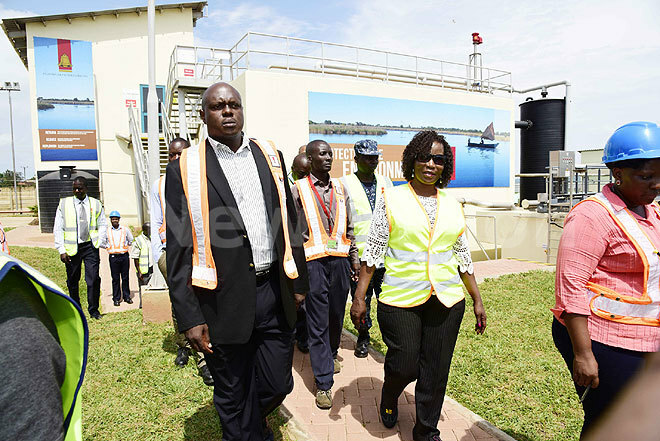UBL launches sh20b waste treatment plant
This she said will enable them (industries) make their investments more sustainable.
PIC: One of effluent treatment plants processing water before being discharged into Lake Victoria at Uganda Breweries Ltd, during the launch of new sh20b plant. (Credit: Kennedy Oryema)
KAMPALA - Kampala Capital City Authority (KCCA) executive director Jennifer Musisi wants all industries in Kampala to invest in innovative solutions to protect the environment, water and health of Kampala residents.
She said this will enable industries make their investments more sustainable.
"When industries invest in wastewater treatment, recycling and reuse, the long term economic benefits in terms of resource recovery are much more than the impacts of pollution," she said.
The KCCA boss made the remarks while launching a sh20b effluent water treatment plant at Uganda Breweries Limited in Luzira, a city suburb.
The plant according to Mark Ociti, the company's managing director, was commissioned after the recent expansion of the original plant that was constructed in 2005 to manage a production capacity of 800, 000 hectoliters per year.
With the new expansion, the plant now manages a production capacity of up to 1.4million hectoliters per year.
"We recognize that our operations rely to a great deal on a robust environment and flourishing natural resources, which is why we work hard to ensure that our processes do not contribute to long term depletion or irreparable damages to environment and atmosphere," said Ociti.

UBL managing director Mark Ociti guides KCCA executive director Jennifer Musisi during a tour of the new plant. (Credit: Kennedy Oryema)
Describing the waste plant as yet another innovative project in an area which has for many years been underscored by industries in Kampala City, Musisi said UBL's investment is a significant contribution to Kampala's transformation into a clean, green, habitable and healthy city.
"Besides restructuring the institution, putting in place efficient systems and working on the basics (infrastructure, hospitals, schools, markets, sanitation, among others), environmental sustainability and pollution control had been a key priority for Kampala city's transformation agenda," she said.
In 2012, KCCA, with the support of GIZ and lead government agencies, set up a Kampala pollution taskforce to generally work out solutions within the different institutional mandates to reduce escalating pollution levels from industries within the city.
Last year, it initiated the Green Industry Campaign which goes beyond the regulation and enforcement. The campaign entails looking at working together with industries through trainings, capacity building in terms of pollution control and technical assistance to improve resource use efficiency within industries.
It is also a partnership with industries to work on innovative projects in areas of greening, flood control, waste management.
How the water treatment process works
Explaining the treatment process, Moses Okol, the supply governance manager said the waste water only involves physical and biological treatment.
He said water from all sections of the brewery comes through all the drainages and it is sieved from the course screen to remove particles.
"The water treatment plant process then involves removing solids from the waste stream, restoring the pH balance of the water, converting organic material into biogas and sludge, disinfecting the waste water and then returning it to the lake."
Whereas the sludge (fertilizer) is given away to farmers for free, the biogas also produced out of the process is used to power the generators used in the factories.